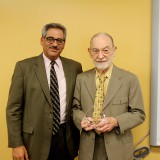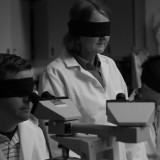| Animal Behavior Core
Consistent with the goal of UH to solidify its status as a Carnegie-Designated Tier-One Research Institution, the Animal Behavior Core (ABC) facility offers the UH research community access to equipment, training and services used to test behavior in rodents utilizing specialized state of the art equipment. The ABC also offers other services including consultation on experimental design, implementation and statistical analysis. |
| Advanced Computing Research Laboratory Founded by Dr. Lennart Johnsson, the ACRL focuses on computational and data Grids, high-performance scientific computation, parallel algorithms, adaptive, Grid-aware, high-performance software and tools for creation thereof, middleware for Grids and parallel computers, especially communications related middleware, performance modelling, and problem solving environments. |
 Research in the Computational Biomedicine Laboratory is motivated by fundamental open problems in the broad area of image analysis, with an emphasis on applications that address some of society’s greatest challenges. The overall theme is to develop a comprehensive framework that will lead to improved algorithms for analyzing multidimensional data in search of meaningful information. The ultimate goal is to allow computers to aid humans in taking full advantage of the multitude of data sources available through today’s technology to extract relevant information in an unobtrusive, reliable, accurate, and timely manner. Research in the Computational Biomedicine Laboratory is motivated by fundamental open problems in the broad area of image analysis, with an emphasis on applications that address some of society’s greatest challenges. The overall theme is to develop a comprehensive framework that will lead to improved algorithms for analyzing multidimensional data in search of meaningful information. The ultimate goal is to allow computers to aid humans in taking full advantage of the multitude of data sources available through today’s technology to extract relevant information in an unobtrusive, reliable, accurate, and timely manner. |
|
|
Developmental Behavioral Neuroscience LaboratoryThe overarching theme of Dr. Therese Kosten‘s Developmental Behavioral Neuroscience Lab is to understand the contributions of genetic and environmental factors that influence and shape behavior via the involvement of the hypothalamic-pituitary-adrenal (HPA) axis and dopaminergic and noradrenergic systems. She states, “I study how behaviors reflective of addiction (e.g., self-administration, conditioned place preference, etc) are affected by stress, sex, and early life manipulations. Another aspect of my research can be considered translational as it involves medication development. For example, we are constructing and testing vaccines for methamphetamine abuse and are identifying new pharmacological targets for alcoholism that we test using maintenance and reinstatement of operant responding for alcohol procedures. Broadly, my research program encompasses the areas of motivation, emotion, and learning with a focus on limbic regions, such as the nucleus accumbens and hippocampus.” |
Developmental Neuropsychology LaboratoryThe Developmental Neuropsychology Lab is run by Paul T. Cirino, Ph.D. We have a primary interest in understanding the neuropsychological, developmental, and instructional aspects of neurodevelopmental disorders. Particular populations of interest include students with mathematical and reading disorders, and spina bifida. We have a specific interest in the overlap among the neuropsychological domains of working memory, attention, and executive function, and their relation to academic skill and difficulty. |
| Developmental Psychopathology Laboratory In the Developmental Psychopathology Lab at University of Houston our research focus is on the early identification of psychiatric disorders. One line of research focuses on social-cognitive, affective, and reward processing as early markers of psychiatric disorder in children and adolescents. A second line of research focuses on the development of diagnostic measurement tools to facilitate the early identification and treatment of psychiatric disorder in children and adolescents. The lab is run by Dr. Carla Sharp. |
 Dr. Ricardo Vilalta’s Pattern Analysis Laboratory provides state-of-the-art techniques for analyzing scientific data. The laboratory evolved in response to the massive amounts of data about our solar system and the entire universe captured by various sensor devices. Processing and analyzing this voluminous data requires algorithms that identify meaningful patterns efficiently. The lab conducts research at the intersection of machine learning, statistics, data mining, physics, and natural sciences. Dr. Ricardo Vilalta’s Pattern Analysis Laboratory provides state-of-the-art techniques for analyzing scientific data. The laboratory evolved in response to the massive amounts of data about our solar system and the entire universe captured by various sensor devices. Processing and analyzing this voluminous data requires algorithms that identify meaningful patterns efficiently. The lab conducts research at the intersection of machine learning, statistics, data mining, physics, and natural sciences. |
 The Texas Center for Learning Disabilities (TCLD) is a multidisciplinary research center headed by Dr. Jack Fletcher that addresses learning disability (LD) definition and measurement issues, the role of executive functions in reading comprehension, and in interventions for students with reading difficulties; and the neurobiological correlates of LD. This center supports research that leads to a more comprehensive classification of LD, a more integrated understanding of intervention for children with reading problems, and important cross-discipline insights into the nature of LD. Currently, this research takes the form of four projects to be conducted over the next five years. The Texas Center for Learning Disabilities (TCLD) is a multidisciplinary research center headed by Dr. Jack Fletcher that addresses learning disability (LD) definition and measurement issues, the role of executive functions in reading comprehension, and in interventions for students with reading difficulties; and the neurobiological correlates of LD. This center supports research that leads to a more comprehensive classification of LD, a more integrated understanding of intervention for children with reading problems, and important cross-discipline insights into the nature of LD. Currently, this research takes the form of four projects to be conducted over the next five years. |












